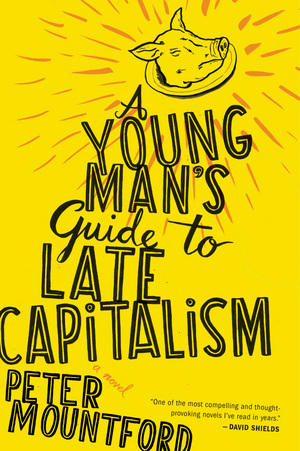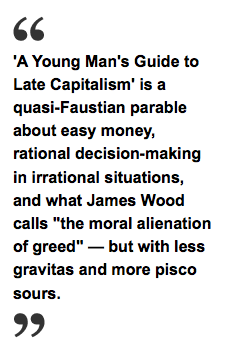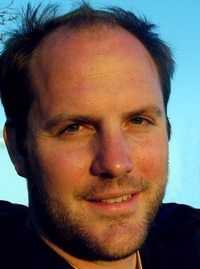
A Young Man's Guide to Late Capitalism
By Peter Mountford
Hardcover, 304 pages
Mariner
List Price: $15.95
A Wry Jab At Capitalism In 'Young Man's Guide'
April 21, 2011 - National Public Radio (NPR)
by Jessica Loudis
Several things set Peter Mountford's impressive debut, A Young Man's Guide to Late Capitalism, apart from the few finance-driven novels that have emerged in the wake of the economic meltdown. For starters, the story doesn't unfold in the echo chambers of Wall Street or moneyed New England (far from it, actually; the novel takes place in La Paz, Bolivia), and our overeducated anti-hero doesn't wander blithely into the world of corporate finance. Unable to resist the allure of retiring by 40 — he's 27 — Gabriel de Boya knows perfectly well what he's getting himself into, and considers vanquishing guilt part of the learning curve.
Not that there's much to overcome: Mountford's protagonist has a postmodern novelist's grasp of ambiguity, and ethical choices are considered in gray scale, making him a realistic character in a surreal historical moment. A welcome contribution to what could be called banker lit, A Young Man's Guide is a quasi-Faustian parable about easy money, rational decision-making in irrational situations, and what James Wood calls "the moral alienation of greed" — but with less gravitas and more pisco sours.
Also, it's very funny.
A Young Man's Guide, opens three years before Bear Stearns' collapse, and spans four weeks in the life of de Boya, a young business journalist-turned-undercover hedge fund analyst sent to Bolivia for political recon. Between posing as a freelancer and sleeping with a barbed and perennially naked Wall Street Journal reporter, Gabriel worries about the shelf life of his job, which he attempts to extend by trafficking in rumors about oil nationalization.
 Through fortune-cookie emails to his boss in New York, Gabriel maintains the illusion that he knows what he's doing, and, equally suspiciously, that he's able to discern the economic future of a country that "openly preferred to see things as they should be, rather than as they were." Even after the election of Evo Morales, protesters gather outside his hotel on a daily basis simply to make a point, and it's not lost on Gabriel that his favorite cafe in Laz Paz is ominously named the Cafe de los Presidentes Ahorcados ("cafe of hanged presidents"). Death and revolution hang in the air, and those getting away with something know that their heads could be next on the not-always-proverbial chopping block.
Through fortune-cookie emails to his boss in New York, Gabriel maintains the illusion that he knows what he's doing, and, equally suspiciously, that he's able to discern the economic future of a country that "openly preferred to see things as they should be, rather than as they were." Even after the election of Evo Morales, protesters gather outside his hotel on a daily basis simply to make a point, and it's not lost on Gabriel that his favorite cafe in Laz Paz is ominously named the Cafe de los Presidentes Ahorcados ("cafe of hanged presidents"). Death and revolution hang in the air, and those getting away with something know that their heads could be next on the not-always-proverbial chopping block.
As a half-Chilean, half-Russian American, Gabriel is able to move freely between the worlds of cocaine-snorting journalists and the Bolivian elite, an "amphibious" status that comes in handy when he starts dating Evo's press attache. Lenka is a single mother who bears more than a passing resemblance to his academic firebrand mother, and their relationship pits love against careerism. Gabriel's wildly inflated salary is earned through groveling for information, and while he develops genuine affection for Lenka, he's not above needling her for information — and, when she provides it, threatening her job by putting it to use. Nor is Gabriel above lying to his mother about the nature of his employment — he tells her he's working for an eco-friendly investment firm — when she travels to Bolivia on assignment for The Nation. Game theory and Machiavelli are used as justification, but even in the thick of deceit, Gabriel is goofy enough to be charming, and legitimately likable as a narrator.
 (left) Peter Mountford spent three years of his childhood in Sri Lanka and lived the rest of the time in Washington, D.C. He has written for the Michigan Quarterly Review and the Boston Review, among other publications. Photo: Jennifer Mountford
(left) Peter Mountford spent three years of his childhood in Sri Lanka and lived the rest of the time in Washington, D.C. He has written for the Michigan Quarterly Review and the Boston Review, among other publications. Photo: Jennifer Mountford
The plot starts to spiral when Lenka feeds Gabriel a real tip about the government's plans, setting in motion a scheme to short the market. If it succeeds, his strategy, characterized as "the dapper uncle of clubfooted larceny," will let Gabriel retire in Bolivian luxury. If it fails, he'll be unemployed and back in New York, exactly where he expected to be all along. Such is the moral calculus of a 27-year-old would-be master of the universe.
A writer less talented than Mountford might have left things here, or forced the novel into a neat morality play. Protestant ethics, however, aren't indigenous to the Wall Street or Latin America of A Young Man's Guide, and distinctions between revolutionaries and hucksters are especially slippery. Lenka turns out to be as Mephistophelean as Gabriel; Gabriel's compulsions are framed somewhat sympathetically, driven by ambition and the conspicuous consumption of successful former classmates: "Other people were addicted to gambling, work, sex, but Gabriel was mesmerized by the fluctuations in his brokerage account. It was trite and it was a waste of time and yet somehow Gabriel suspected he was not alone in this." That he's not alone is the novel's main insight, and to Mountford's credit, he explores its implications outside of a moral register. As Gabriel scrutinizes his bank account, A Young Man's Guide captures the moment in which concessions become norms without anybody noticing.
Excerpt: 'A Young Man's Guide To Late Capitalism'
by Peter Mountford
Charm was not among Priya's gifts. She was lean and ambitious and had a temperament of hammered iron. Priya was from Bombay and had been in charge of emerging-markets equity for the Calloway Group for five years. She had studied at Oxford in the nineties and when she finished there had promptly been launched as a fund manager at Lehman, where her portfolio was the only one to turn a profit during the Asian crisis. A millionaire by twenty-eight, she could supposedly intuit peaks and troughs in the market as well as Warren Buffett could. Every day she spent an hour at the gym with her personal trainer, ate a great many vitamins, and drank two liters of green tea. She didn't touch alcohol or cigarettes. "I would like to outlive my own children," she'd said to a Financial Times reporter in an interview in 1997. But as it turned out, the conception, carrying, birthing, and rearing of children were not activities that interested her much.
When Gabriel sat down with her for his interview at the Calloway Group's office in Weehawken, she stared at him and said nothing. He held back too. He had already decided to say as little as possible. Better to lure her out. Oscar Velazquez—Calloway's analyst for the wealthier Latin American countries, and Gabriel's first interviewer—had said she was thirty-seven, which would make her ten years Gabriel's senior, but she looked like a child. Even in her austere gunmetal gray suit she looked juvenile: the most solemn and ponderous adolescent on the planet, but an adolescent nonetheless.
After a while, when Gabriel said nothing, she'd nodded once and said, "You would be Oscar's counterpart in the poorer countries. We like you because you're like Oscar: you know the places, you know people, you speak Spanish, and you even sort of look like a native." She enumerated his qualities very matter-of-factly, including the part about his ethnicity. "Since I came to Calloway," Priya said, "I have steered clear of what I call the cucarachas, those chronically dysfunctional Latin American countries like Guatemala, Panama, et cetera." She inhaled deeply, noisily, through her nose, exhaled slowly and quietly through her mouth. She said, "Our default position will continue to be zero involvement with them, but we need to pay attention, which is why we're creating this position. We can't afford to miss anything."
"I understand," he said. He waited, but she didn't elaborate. She had the corner office, and the views across the Hudson to lower Manhattan were postcard-ready. She also had two large wide-screen LCD monitors mounted on the wall like art running a colorful array of stats from Bloomberg. But she never took her eyes off Gabriel, so he avoided looking at the views and tried instead to match her gaze. She did not seem a particularly mysterious person. She exhibited above all a surgical focus. So while she could address whatever problem sat directly in front of her, multitasking would be difficult, and this, he realized, was the source of her awkwardness, because conversations require a certain talent for juggling.
Hedge funds had traditionally played the numbers from a safe distance, but they had also found that there were huge surprises occasionally, which was why it was theoretically worth it to Calloway to spend a few million in wages and travel expenses every year to have half a dozen analysts out in the world, keeping an eye on things. He waited for her to continue, but when she didn't say anything, he resuscitated the conversation. "So, I'll research the cucarachas?"
"Yes," she said and picked up her line of thought. "Oscar has his hands full with Brazil, Argentina, and so on, so you'll baby-sit the basket cases. There's not much action there, but that's life. Meanwhile, I stay here and go over the numbers with our quant for Latin America, Paul. You should meet him, but I think he just went down to the pier. He goes there twice a day to do a thousand jumping jacks."
Gabriel nodded. "A thousand jumping jacks?"
"Yes, he's concerned about his heart. It's a sedentary life."
"Right. Better safe than sorry."
"Not really. Paul's an idiot." Her mouth twitched as if she was trying to smile, but her muscles couldn't manage it and instead made the gesture of someone who was famished and anticipating food. Gabriel bit his lower lip and laced his fingers together in his lap. He did not let his gaze wander, despite an overwhelming urge to look away. It had been sarcasm, of course. Paul was not an idiot. A quant's analytical powers were expected to be cripplingly powerful. It was one of the few jobs for which a dash of autism was considered a plus.
Priya—who was, it seemed, something of a quant herself—straightened her back, sucked in her cheeks, twisted her head in one direction, then the other, and relaxed. She looked at Gabriel for a while, and when he didn't speak, she sighed as though already exasperated. "Listen," she said, "we like you because you seem kind of cunning, and, after reading your work, we think you might have a talent for reading people. Why do you want to work for us?"
He did not have an answer ready. To buy time, he broke eye contact and looked across the river at lower Manhattan. They were still scooping out the ground down there, but everyone knew that no more bodies would be found; there was nothing left but a giant ragged hole. Gabriel looked back at her and, for lack of a better position, told the truth. He said, "I want to make a shitload of money for a while."
She nodded, unsurprised. She seemed to want him to say more, so he added, "I'd like to retire at forty."
"If you manage to keep your job, that shouldn't be a problem." She glanced at the Bloomberg screens and he thought she almost smiled. Then she looked back at him. "So where do you see Mexican interest rates in a year?"
The millionaire thing hadn't interested Gabriel during high school, when his bright yellow Sony Walkman was full of punk rock, and it hadn't meant much to him when he was in college either, where he manned a soft-serve ice cream stand on campus for fifteen hours a week. It didn't really mean much then that he was broke, because everyone was broke. But five years of scraping by in New York City was another thing. Being young and well-educated and destitute in the city had a way of sharpening a person's desires. Demonstrations, overt and implied, of the advantages of having heaps of money were so common that they ceased to register. So the feeling of wanting matured until what had been straightforward professional ambition became tinged by a hint of avarice. Not that Gabriel was, or ever had been, a greedy person; but money, in general—the plain and unassailable acts of acquiring and spending it—had turned out to occupy a more important role in adulthood than he'd expected. The issue finally wasn't that he wanted to be rich, per se, but that he wanted to be done with so much wanting. It was a feedback loop, and the only way out was deeper in: he needed to have enough money to be done with the issue of money forever.
And though he wished it weren't so, once certain college buddies started buying giant condos in the Meatpacking District and kicking up their midnight blue Prada sneakers on their burnished leather ottomans, he did feel a many-pronged discontent. The shame did not temper the envy; it just made it queasy. Of course, they were all privileged, spectacularly so, on the global level. But this was not a global situation. It was the United States, where he had been born and seemed likely to remain in the bland band of the upper-middle class.
It wasn't lost on him that each one of his young and newly rich friends, all of whom had been dateless for years, was now constantly anchored to the lithe arm of a woman so beautiful that her beauty itself seemed monstrous. Those friends started to look different too. They wore pointy black shoes, sunglasses on cloudy days. At Sunday brunch, they ordered off the menu, made easy banter with the waiters, and were altogether more confident and self-assured than anyone their age had a right to be. It was as if some irksome and never fully identified existential question that still nagged the rest of them had been finally and completely resolved for those few.
So there was, in the end, no question about whether Gabriel would take the job at Calloway. The question literally never presented itself to him. After Gabriel's interview with Priya, Oscar handed him a binder full of legal disclosures and recommended that he go through the paperwork with his lawyer before signing.
Gabriel didn't have a lawyer and didn't want to hire one, couldn't really afford one. Anyway, he didn't want to hear about the fine print. So he signed and initialed the papers while sitting on the PATH train back to New York from Weehawken.
Excerpted from A Young Man's Guide to Late Capitalism by Peter Mountford. Copyright 2011 by Peter Mountford. Excerpted by permission of Mariner Books, a division of Houghton Mifflin Harcourt. All rights reserved.